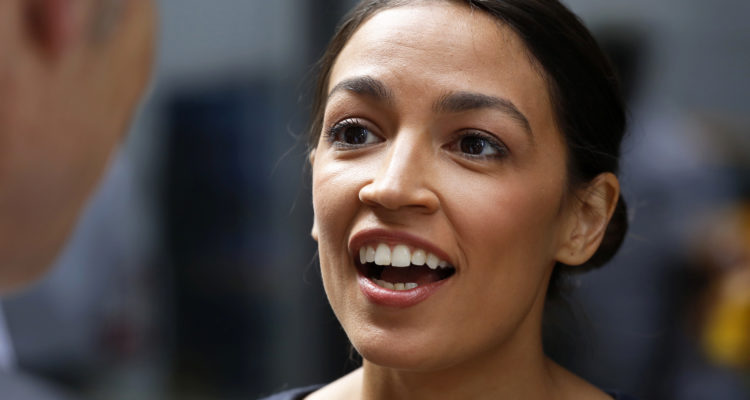To have Ocasio-Cortez’ language on the Israeli-Palestinian conflict normalized among her base is particularly unnerving, regardless of whether or not there exist facts to back up the claims, because they will be taken as truths nonetheless.
By: Noah Phillips
With her primary-election upset victory over incumbent Representative Joe Crowley, Alexandria Ocasio-Cortez—at 28 years old—is the emerging face of millennial politics and an ardent proponent of modern socialist ideology. While she certainly has mobilized her supporters effectively, Ocasio-Cortez’ campaign is marred by her blatant lack of any knowledge on the Israeli-Palestinian conflict, and yet, her unseemly outspokenness on it’s intricacies.
Over the course of her campaign to unseat Crowley, Ocasio-Cortez railed against the actions of the Israeli government; yet on her July 13 interview on PBS’ Firing Line, where she referred to “the occupation of Palestine,” the settlements, and drew vague comparisons between Israel and Ferguson Missouri, Ocasio-Cortez’ lambasting culminated with five words: “I am not the expert.”
Ocasio-Cortez was neither pressed or challenged on her views on the conflict by host Margaret Hoover, but rather asked to “expand” on her beliefs, which she failed to do for the sole reason that she has no views, no individual contemplations on the matter at hand, but a party line which she touts and parades around on Twitter and at events. She’s committed the anti-Israel playbook to memory—on full display during the interview—liberally claiming “occupation” and “massacre” (in a Tweet) without comprehension of what she’s spouting: hyper-partisan language which deliberately denies fact.
A sequence of uhs and ohs
And while Ocasio-Cortez is certainly apt at dishing out this rhetoric with the adroitness of a seasoned politician, during the interview she follows her unsubstantiated assertions with a sequence of uhs and ohs, as she connives a way to legitimize her ideas… without factual evidence to support it.
All in all, the greatest grievance against Ocasio-Cortez is her enduring stubbornness. Throughout her campaign, she easily could have remained silent on the Israeli-Palestinian conflict due to insufficient research, but rather, it took an utter blunder on a major national news network for her to admit that she is not well-versed in the geopolitics of the region.
Politicians cannot be blamed for not being savvy in every area of expertise, but they can be faulted for expressing a highly controversial and largely unjust opinion in these circumstances, in the absence of such knowledge, which Ocasio-Cortez did throughout her bid.
What’s troubling is that Ocasio-Cortez is idolized by a sizable portion of young people and appears to be on the fast-track to becoming a major fixture in the Democratic party after unseating the Chair of the House Democratic Caucus and the long-term, well-respected politician Joe Crowley, and obtaining fame overnight. Her socialist views and millennial-age inherently binds her to the up-and-coming left-wing generation of voters and, to a large extent, garners their support and attention from the get-go.
To have Ocasio-Cortez’ language on the Israeli-Palestinian conflict normalized among her base is particularly unnerving, regardless of whether or not there exist facts to back up the claims, because they will be taken as truths nonetheless.
Israel is caught in the crosshairs
Ocasio-Cortez, unfortunately, is a part of a growing trend of partisanship and far leftism among the Democratic party, a struggle in which support for Israel is caught in the crosshairs. After her interview with Margaret Hoover, Ocasio-Cortez appeared on Democracy Now! hosted by Amy Goodman, where she took a neutral stance on the two-state solution rather than outrightly stating her recognition of Israel’s legitimacy and right to exist, a stance she had previously adopted. The ‘partisanization’ of Israel-centric issues over recent decades is undeniable, hence the period of no productivity in the United States-Israel relationship under Obama, and almost immediate progress under a Republican president.
While there exist notable exceptions to this trend, namely Chuck Schumer, Jerry Nadler, and some others, Democratic politicians know what vernacular on the conflict is socially acceptable among their crowds and which isn’t. They know the talking points and the key players, but adhere closely to the Democratic mantras and idioms primarily bashing Israel.
Such partisanship has permeated into even the highest ranks of the Democratic party: Bernie Sanders—who is currently campaigning with Ocasio-Cortez in Kansas—took to Twitter in April to pledge his support for the Gaza protesters while disregarding the violent actions of many protesters and the significant role played by internationally-recognized terrorist organizations, just one of many lopsided stories portrayed by Democrats as the whole picture of what occurred.
A wake-up call
With Democrats poised to dominate Congress in the midterm elections this November—including Ocasio-Cortez, the clear frontrunner in her district—and potentially the presidency in 2020, it’s incredibly dangerous and damaging to have untrue statements being taken as fact by policymakers. While Ocasio-Cortez’ PBS embarrassment was a high-profile instance of Democratic lack of awareness on the conflict, it served as a wake-up call to viewers that rhetoric will always merely be rhetoric, and the distinguishing factor between Ocasio-Cortez and other, more informed politicians, is possession of the facts that reinforce their claims.
Noah Phillips is a young writer with a keen interest in Jewish and Israeli affairs. He is the founder of the Jewish Examiner as well as a syndicated columnist for various publications. Follow Noah on Twitter @noahaphilli





